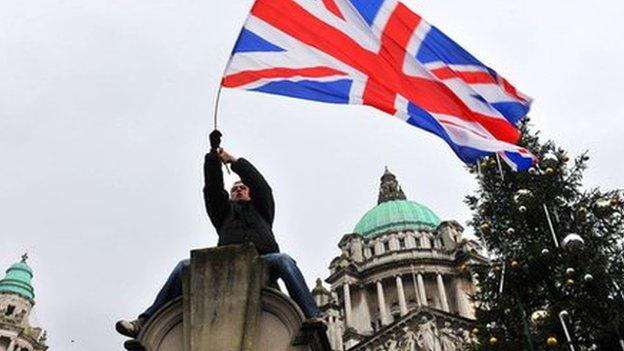NI talks: Broad agreement is brokered on some key issues
- Published
Mr Robinson said the deal provided an "agenda for a better government", while Mr McGuinness said it was "a remarkable achievement"
A broad agreement has been brokered on some key issues in the cross-party Northern Ireland talks.
Prime Minister David Cameron said he was delighted a workable agreement had been reached.
Irish Foreign Affairs Minister Charlie Flanagan said it "sets out a plan for financial and welfare reform".
The two main parties, the DUP and Sinn Féin have said they are recommending the proposals to their executives, but some other parties are disappointed.
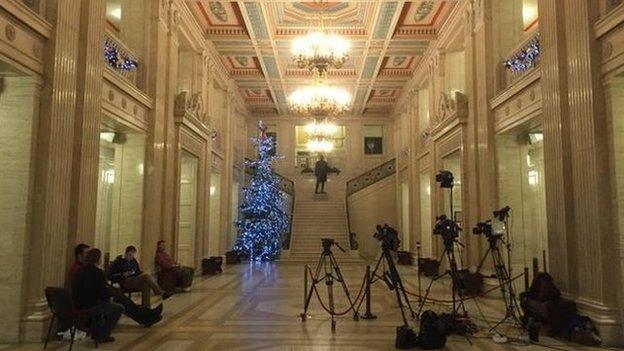
The media gathered inside Stormont waiting for the outcome of the talks
Some key financial points in the document:
The total value of the government package represents additional spending power of almost £2bn
A final balanced budget by the NI Executive for 2015-16 needs to be agreed in January
The executive will adopt in January a comprehensive programme of public sector reform and restructuring
Legislation will be brought before the assembly in January 2015 to give effect to welfare changes alongside further work to develop and implement flexibilities and top-ups from the block grant as part of a package of measures
Implementation of these welfare changes will begin to take place in the financial year 2015-16 and implementation will be complete by 2016-17
Legislation will be introduced as soon as parliament returns to enable the devolution of corporation tax in April 2017
Northern Ireland First Minister Peter Robinson said he would be recommending the document, external to his party executive.
"Of course every one of us would have liked to have had a more comprehensive and complete agreement but this is as much and more than we have ever been able to do on these issues in the past," he said.
"So it is a very significant agreement."
Sinn Féin president Gerry Adams said the party's negotiations team would also be recommending the proposals to its ard chomairle (party executive).
The party's Deputy First Minister Martin McGuinness said the deal had the potential to give the executive a "fresh start".
"And it is a fresh start we need to seize with both hands," he said.
"I think it's been a remarkable achievement."
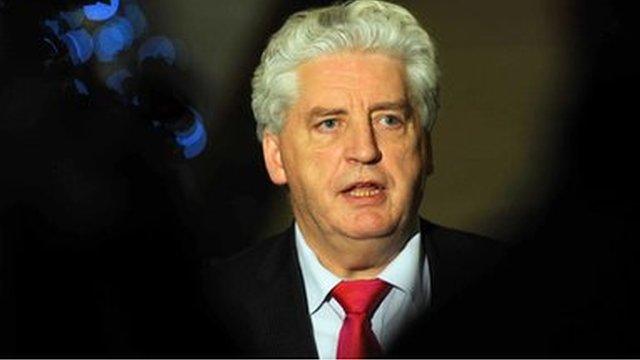
Alasdair McDonnell, SDLP, said the deal "falls short"

BBC NI political editor Mark Devenport: Key issues addressed
The Stormont House negotiations tackled a number of contentious issues.
Three - flags, parades and the past - were inherited from the failed talks chaired by the US diplomat Richard Haass a year ago.
Read more here.

However, Ulster Unionist Party leader Mike Nesbitt said no party was able to give the agreed proposals 100% endorsement as "they all have their own processes", but he said he would ask his own party to give the agreement "a fair wind".
Alliance leader David Ford said he made it clear to the government that he would accept what was in the paper, but said it did not go far enough to meet the needs of Northern Ireland society.
SDLP leader Alasdair McDonnell said he believed the "deal falls short" and that he was disappointed the document was not as comprehensive as he hoped it would be.

Analysis by BBC Ireland Correspondent Chris Buckler
"A crisis has been averted. We have a broad agreement about a range of issues.
"I am led to ask the question, when is a deal actually a deal? Certainly, as far as the DUP are concerned, the Ulster Unionists and now Sinn Féin, as well, they all believe this is a good proposal.
"The SDLP and Alliance are both sounding a note of caution. Alliance says it falls short of what is needed. The SDLP say they are disappointed.
"Although the crucial issue of cash has, for the moment, been sorted, there are other issues in this that probably haven't been fully addressed.
"The issue of the past, parading and the flying of flags in Northern Ireland, these are all crucial and very controversial issues.
"As far as flags and parades are concerned, we don't think that has been totally sorted.
"Until we see the fine detail of this deal, we won't know how much of an agreement this is and how much of an agreement it isn't."

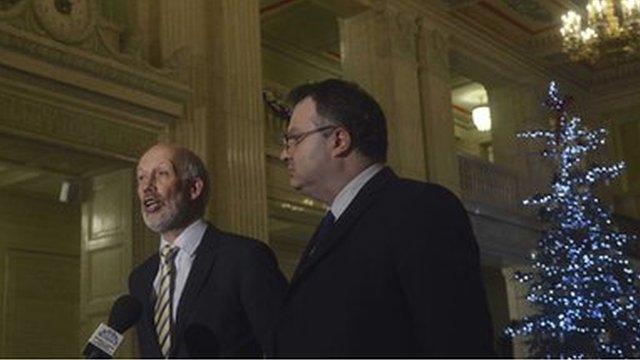
David Ford said the paper did not go far enough
Mr McDonnell said the party was disappointed by parading proposals, while the measures on dealing with the legacy of the Troubles fell short of those put forward during last year's talks chaired by former US diplomat Richard Haass and Harvard professor Meghan O'Sullivan.
Other key points agreed
A Commission on Flags, Identity, Culture and Tradition will be established by June 2015 as the basis for further addressing these issues, to report within 18 months of its being established
Powers to take responsibility for parades and related protests should, in principle, be devolved to the Northern Ireland Assembly
The executive will, by 2016, establish an Oral History Archive to provide a central place for people from all backgrounds to share experiences related to the Troubles
A new independent body, the Historical Investigations Unit (HIU), will be established to take forward investigations into outstanding Troubles-related deaths
A new body, the Independent Commission on Information Retrieval (ICIR), will be established to enable people to seek and privately receive information about the (Troubles-related) deaths of their next of kin. The information will be inadmissible in criminal and civil proceedings.
The number of assembly members should be reduced to five members per constituency, in time for the 2021 Assembly election
Arrangements to be put in place by March 2015 for parties which choose not to take ministerial positions in the executive they are entitled to, to be recognised as an official opposition
A reduction in the number of executive departments from 12 to nine should be made in time for the 2016 assembly election
A new process will be brought forward for a more transparent and robust system for assembly members' salaries and expenses.
But Northern Ireland Secretary of State Theresa Villiers said it had been a good day.
She said a draft agreement for the parties had been put on the table taking on board many hours of discussions and that it was positively received.
She said it was a "genuine step forward" in progress on "some of the critical issues in Northern Ireland".
Former US diplomat Richard Haass chaired cross-party talks a year ago on the issues of flags, parades and the past. Those talks broke up without any resolution.
Mr Haass said progress on dealing with the legacy of the Troubles was perhaps the most significant element to the agreement.
"The good thing, I think, more than anything else was that there was significant progress on dealing with the past, setting up these new institutions that will provide mechanisms for dealing with a lot of the unresolved issues," he said.
The current talks on welfare reform, the past, flags and parades have lasted 12 weeks.
On Tuesday night, the Northern Ireland Office confirmed it would not go ahead with a panel to resolve a parading dispute in north Belfast.
It said the government was committed to finding a resolution to the Twaddell/Ardoyne dispute, but that a mediation panel is not covered by Tuesday's agreement.
- Published23 December 2014
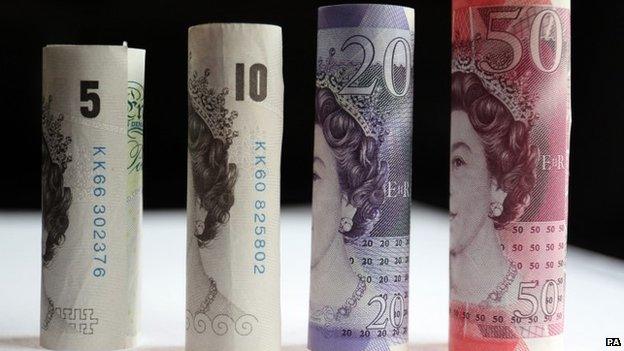
- Published23 December 2014
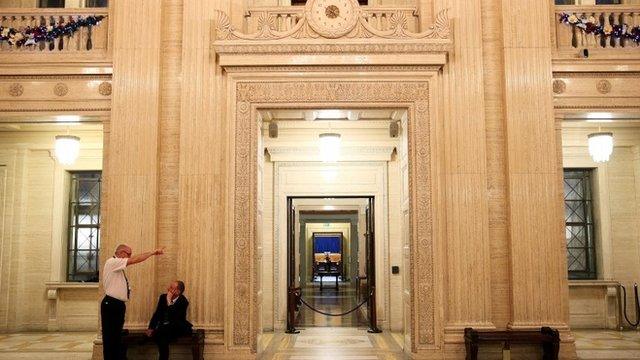
- Published23 December 2014
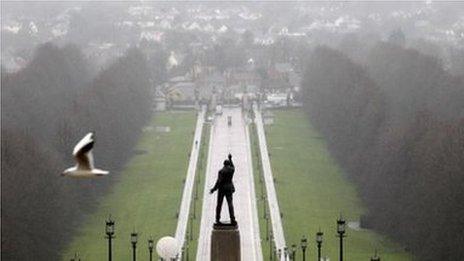
- Published19 December 2014
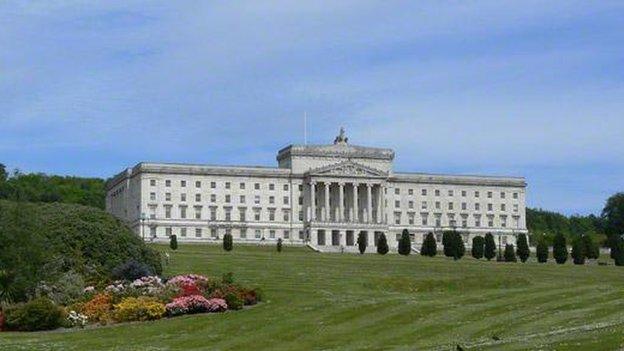
- Published12 December 2014
